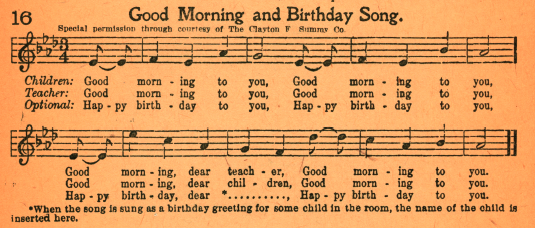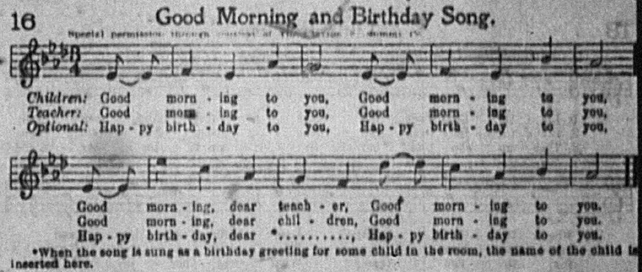Happy Birthday Copyright Controvery

Attention Musicians: Please make sure you COPYRIGHT YOUR MUSIC.
Some indie musicians have shared their music with others then had a huge shocker when someone else tried to copyright the music they created. You definitely don’t want to be in that position, or endure a legal battle to protect your music, so please make it a practice to copyright your music.
Regarding music copyrighting, there is now a new controvery over the “Happy Birthday Song“. For years Warner/Chappell has been collecting millions in royalties (around $2 million per year) off of the song “Happy Birthday” but recent evidence revealed that the song may actually belong in the public domain.
It appears that the song was put into the public domain by 1922 at the latest, and there is good evidence that “Happy Birthday” is in the public domain and the Clayton Summy company (who was granted the copyright in 1935) may have known that. It has been argued, however, that the 1935 copyright was just on a particular piano arrangement, but not the melody or lyrics to Happy Birthday to You-which had both been around long before 1935.
Also, it appears that Warner/Chappel has long had in its possession evidence that the song was at least published in 1927 contrary to the company’s own claims in court and elsewhere that the song was first published in 1935. The plaintifs in the case note that there’s a line right under the title song that is blurred almost beyond legibility.
The plaintiffs went on a search for the original copy of the Everyday Song Book, finding the 15th edition that was shown in the documents as well as earlier versions and saw no reference to a copyright, but that the song is published via Special permission through courtesy of The Clayton F Summy Co.
Under the 1909 Copyright act this would matter quite a bit.
Under Section 9 of the 1909 Copyright Act, “any person entitled thereto by this Act may secure copyright for his work by publication thereof with the notice of copyright required by this Act” affixed to all copies of the work…. At a minimum, Section 18 of the 1909 Copyright Act required the notice to include the word “Copyright,” the abbreviation “Copr., ” or the “©” symbol as well as the year of first publication and the name of the author of the copyrighted work…. If the strict notice requirements of the 1909 Copyright Act were not met, the “published work was interjected irrevocably into the public domain.” Twin Books Corp. v. Walt Disney Co., 83 F.3d 1162, 1165 (9th Cir. 1996) (emphasis added). None of these notice requirements was met for the Good Morning and Birthday Song included in the fourth edition of The Everyday Song Book published in 1922.
It’s possible that none of this money should have been paid. It will be up to the courts to decide where to proceed from here.




0 Comments